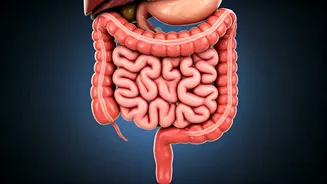Embrace Hydration Daily
Staying adequately hydrated is paramount for optimal gut function. Aim to consume plenty of water throughout the day. Water facilitates smooth digestion,
enabling food to move easily through the digestive tract. It also helps prevent constipation, which can disrupt gut health. Additionally, water aids in the absorption of nutrients, supporting overall health. Try carrying a water bottle with you as a constant reminder to sip regularly, ensuring consistent hydration levels. Consider setting reminders on your phone to drink water every hour to make this habit a part of your daily routine. Proper hydration is a fundamental step toward promoting a balanced and healthy gut environment.
Chew Food Thoroughly
The process of digestion begins in the mouth, and chewing is a crucial initial step. Thoroughly chewing your food breaks it down into smaller particles, making it easier for enzymes in your stomach and intestines to digest it. This lessens the burden on your digestive system, reducing the likelihood of digestive discomfort. It also helps in the absorption of nutrients as food is more easily processed. Make a conscious effort to chew each bite multiple times, focusing on the texture and taste of your food. This practice not only aids digestion but also promotes mindful eating, which can prevent overeating and support overall health.
Eat Mindfully and Slowly
Mindful eating is a powerful tool for supporting gut health. Avoid distractions like screens or work during meals. Focus solely on the act of eating, paying attention to the taste, texture, and aroma of your food. Eat slowly to give your body time to register fullness, which prevents overeating and supports healthy digestion. Eating slowly also enhances nutrient absorption, as your body is better prepared to process the food. This practice improves digestion and contributes to better gut health by optimizing the digestive process. Embrace a calm and relaxed eating environment to maximize the benefits of mindful eating.
Include Probiotic-Rich Foods
Probiotics are beneficial bacteria that live in your gut and are vital for maintaining a balanced gut microbiome. Incorporating probiotic-rich foods into your diet supports gut health by increasing the amount of these beneficial bacteria. Excellent food sources include yogurt (with live and active cultures), kefir, kimchi, sauerkraut, and kombucha. These foods introduce diverse strains of probiotics, which can help improve digestion, enhance nutrient absorption, and boost immunity. Start with small servings to see how your body reacts, gradually increasing your intake as tolerated. Regular consumption of probiotic-rich foods can significantly contribute to a healthy and thriving gut environment.
Embrace Prebiotic Foods
Prebiotics serve as food for the beneficial bacteria in your gut, supporting their growth and activity. Consuming prebiotic-rich foods encourages the proliferation of these health-promoting bacteria, improving gut health. Excellent prebiotic food choices include garlic, onions, bananas, asparagus, and oats. These foods contain fibers that are not easily digested by the human body but serve as fuel for the gut bacteria. Including prebiotics in your diet can enhance digestion, improve nutrient absorption, and promote a balanced gut microbiome. Make sure to integrate a variety of prebiotic-rich foods into your meals to provide a diverse food source for your gut bacteria.
Limit Processed Foods Intake
Processed foods often contain high levels of sugar, unhealthy fats, and artificial additives, which can negatively impact gut health. These ingredients can disrupt the balance of gut bacteria, promoting the growth of harmful bacteria and leading to digestive issues. Processed foods also tend to be low in fiber, an essential nutrient for a healthy gut. Minimize the consumption of processed foods like sugary snacks, packaged meals, and fast food. Opt instead for whole, unprocessed foods like fruits, vegetables, and lean proteins. Choosing fresh, whole foods supports a balanced gut environment, improves digestion, and enhances overall health. Reading food labels carefully can also help identify and avoid potentially harmful ingredients.
Manage Stress Effectively
Stress can significantly affect gut health, as the gut and brain are closely connected. High-stress levels can disrupt the balance of gut bacteria, increase inflammation, and slow down digestion. Find effective ways to manage stress, such as exercise, yoga, meditation, or spending time in nature. These activities help lower stress hormones, promoting a healthier gut environment. Practicing relaxation techniques, such as deep breathing exercises, can also alleviate stress and support digestive health. Prioritize stress management to optimize gut function and overall well-being. Regularly incorporating stress-reducing activities into your life can make a noticeable difference in your digestive health.
Get Adequate Sleep
Proper sleep is essential for overall health, and it also plays a significant role in maintaining a healthy gut. During sleep, your body repairs itself, including your digestive system. Lack of sleep can disrupt the gut microbiome, increase inflammation, and negatively affect digestion. Aim to get 7-9 hours of quality sleep each night. Establish a regular sleep schedule, create a relaxing bedtime routine, and make sure your bedroom is conducive to sleep. Ensure your sleep environment is dark, quiet, and cool. Improve your sleep hygiene to promote healthy gut function and better overall health.
Exercise Regularly
Regular physical activity is beneficial for gut health. Exercise can help improve digestion by increasing blood flow to the digestive system and promoting regular bowel movements. It can also reduce stress and inflammation, which, in turn, supports a healthy gut environment. Aim for at least 150 minutes of moderate-intensity exercise or 75 minutes of vigorous-intensity exercise per week. Incorporate a variety of exercises, such as walking, running, swimming, or cycling, into your routine. Consistent physical activity not only supports gut health but also contributes to overall fitness and well-being. Find activities you enjoy to help make exercise a sustainable part of your lifestyle.
Consult a Healthcare Provider
If you experience persistent digestive issues, seek professional medical advice. A healthcare provider can help diagnose underlying conditions and provide personalized recommendations to improve your gut health. They may recommend specific tests, dietary changes, or supplements based on your needs. It’s always best to consult a medical professional for advice related to your digestive health. A healthcare provider can determine the cause of your symptoms and help you develop a tailored plan to achieve optimal gut health. Do not hesitate to consult a doctor if you experience persistent symptoms, as early intervention can improve your long-term health.





















